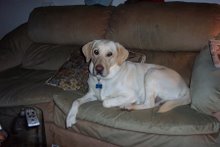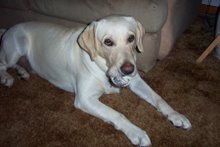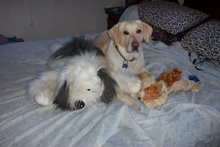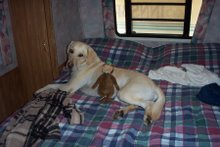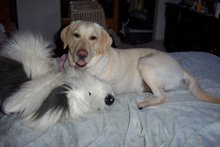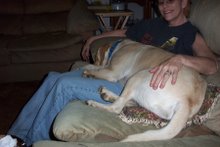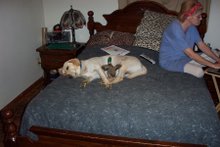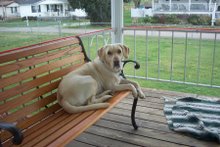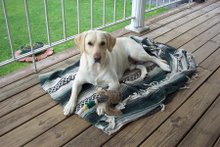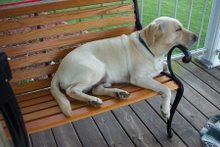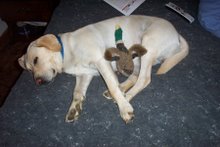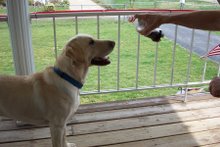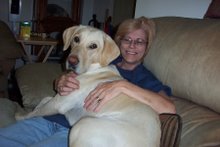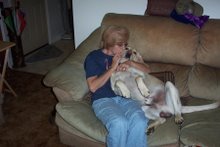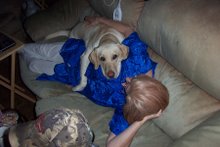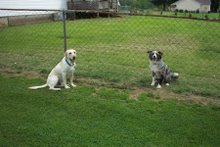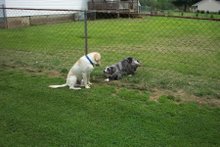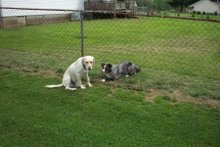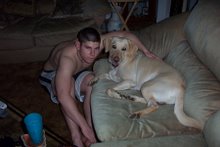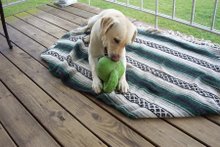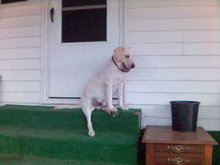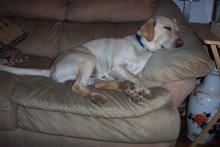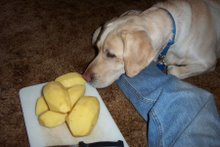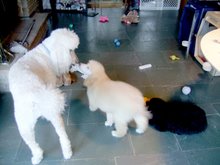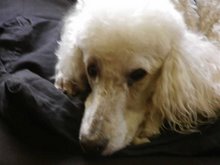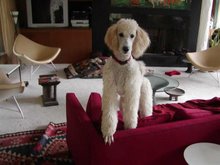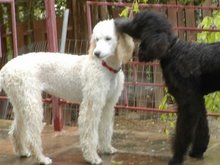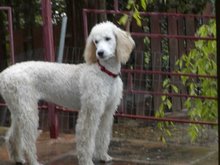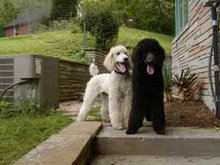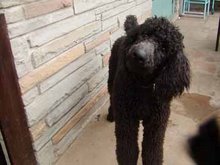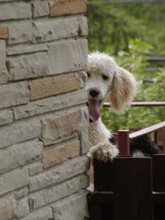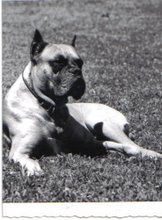On May 15th of 2005, my soul-mate, Kallee, passed away in her sleep. She and I had been together for 13 yrs. She died on a Sunday. The man I had been with for close to 15 yrs. was kind enough to let me bury her on his farm. My husband now, went with me to dig her grave and bury her. As I sat with her body, wrapped in her favorite blanket, I looked around. She was being buried along with many other animals that had belonged to his family.
Like me, his family, and him, loved animals and wanted to bury them with dignity and in a familiar surrounding. When I became a member of his family, we purchased a beautiful Rottweiler named Cratty's Von Maxwell, or Max for short. Max was not my first dog, however. My parents loved Dalmations and I grew up with 3 of them.
The female, my father named Taryton, after the cigarette, because she had a black patch over one eye, died in 1982. Kenny,(my ex), buried her in the backyard of his mother's house. In 1983, we purchased Max. Helen, (my mother-in law), deeded the property where she grew up, on Homestead Rd., across from the Jenkins Plantation, in the Powell Wetlands on Rt. 2, Lesage, WV, to Kenny.
Max was diagnosed with bladder cancer and had to be euthenized in 1992. He became the first member of the cemetery. In this private cemetery, there is a Llama, 2 pygmy goats, a miniature horse, another Rottie, named Ralph, and a mix called Mikey. Kallee was the last to be buried there. Burying an animal on your property, as far as I am concerned, is the ultimate last show of love.
Pet cemeteries that offer burial or cremation services are a fabulous idea. This gives people that don't have the property to bury their beloved pet on, a means of showing that last bit of love and respect to their pets. I know many people feel that animals don't need a funeral. To those people I say, "you obviously have never owned a pet. Because if you had, you would not feel that way."
Kallee and Tamara
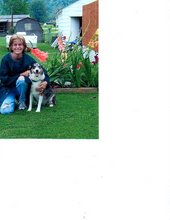
A Beautiful Summer Day.
Madam Kallee, CTD, CGC - 1994-2005 - Certified Therapy Dog and a Canine Good Citizen

I am so pretty!
Kallee, T.D.I., CGC - Certified Therapy Dog and a Canine Good Citizen - 1994-2005

I loved to pose for the camera.
Hat Girl.

The things I do for my mom!
Happiness.

Bubby knows how to scratch a tummy.
Best of Friends.

Mine! No, Mine!, No Mine!!!
Whew !

Bubby wears me out!
This is the Life.

Just relaxing with bubby.
Kallee and Mr. Monkey
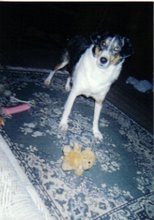
See Mr. Monkey? Wanna play?
Miss Cool.
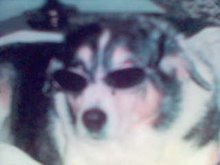
I loved to wear my shades.
Saturday, December 29, 2007
Friday, December 21, 2007
Slain Marine's Dog Adopted By His Family.
ALBANY, Ga. (AP) — A military working dog wounded in Iraq during a rocket attack that killed its Marine handler was adopted Friday by the slain Marine’s family. The adoption of Lex, an 8-year-old German Shepherd, by the family of fallen Marine Cpl. Dustin Lee marked the first time the U.S. military has granted early retirement to a working dog so it could live with a former handler’s family, officials said.
“Nobody can do anything to replace the void in this family,” said Col. Christian Haliday, commander of the Marine Corps Logistics Base in Albany, where Lee and Lex were assigned. “We hope Lex can bring a small piece of his spirit and help maintain his memory.” On hand for the ceremony at the base were the Marine’s parents, Jerome and Rachael Lee, his sister, Mattie, 16, and brother, Cameron, 12, of Quitman, Miss.
“It’s not going to bring back my brother, but it’s something close to it,” said Mattie Lee as she played with Lex after the ceremony. Lee’s family planned to take the bomb-sniffing dog home on Saturday. Military officials initially told the family that Lex had another two years of service before he could be adopted.
But the family lobbied for months — even enlisting the aid of a North Carolina congressman — and the adoption came exactly nine months after the 20-year-old Marine was killed and his dog wounded on March 21 in Iraq’s Anbar Province. 2nd Lt. Caleb Eames, spokesman for the Albany base, said Lee and Lex were sitting outside at a forward operating base in Karmah when they were hit by shrapnel from a 73mm rocket explosion.
“A part of Dustin is in Lex,” said the fallen Marine’s father. “To have Lex at home is a part of having Dustin at home.” Rachael Lee said she believes her son’s spirit will live on through the dog because of their close bond and because they were together during the final moments of her son’s life. “It was blood on blood,” she said. “We can’t get Dustin back, but we have Lex.”
While Marines tried to treat Lee’s wounds, another dog handler was sent to take Lex for treatment, said Staff Sgt. Dana Brown, the regional kennel master for the pair in Iraq. “Lex, from my understanding, was kind of laying on him or near him, protecting him,” Brown said in an interview from the Quantico Marine Base in Virginia. “He just didn’t want to leave him. He knew he belonged there and something was wrong.
Even though he was hurting, he knew he was supposed to stay by his handler.” Brown flew back with Lex to Camp Lejeune, N.C., where the dog’s wounds were treated and she accompanied Lex to Lee’s funeral in April. After 12 weeks of treatment for shrapnel wounds in the shoulder and back, Lex was declared fit for duty and returned to his permanent home at the Albany base.
Brown said Lee and Lex stood out among more than 40 bomb-sniffing dog teams under her supervision, and they performed so well she chose them and one other team to be embedded full-time with specialized units — a Marine reconnaissance unit in Lee’s case. It was Lex’s second tour in Iraq, the first with another handler. “He was cocky,” Brown said of Lee. “He knew he was good and he and his dog were unstoppable.”
Lee joined the Marines after graduating from high school in 2004. His father said his desire to become a dog handler came from the Marine’s mother, who worked with search-and-rescue dogs when Lee was a boy. After completing military police and dog handler training, Lee was assigned to the Albany base in southwestern Georgia. He adopted his first partner, Doenja, and sent him home to Mississippi last year when that 11-year-old dog began losing his sight and had to retire. “Lex is in wonderful shape,” said Eames. “He’s fully operational. His most important mission now is making this wonderful family very happy.”
“Nobody can do anything to replace the void in this family,” said Col. Christian Haliday, commander of the Marine Corps Logistics Base in Albany, where Lee and Lex were assigned. “We hope Lex can bring a small piece of his spirit and help maintain his memory.” On hand for the ceremony at the base were the Marine’s parents, Jerome and Rachael Lee, his sister, Mattie, 16, and brother, Cameron, 12, of Quitman, Miss.
“It’s not going to bring back my brother, but it’s something close to it,” said Mattie Lee as she played with Lex after the ceremony. Lee’s family planned to take the bomb-sniffing dog home on Saturday. Military officials initially told the family that Lex had another two years of service before he could be adopted.
But the family lobbied for months — even enlisting the aid of a North Carolina congressman — and the adoption came exactly nine months after the 20-year-old Marine was killed and his dog wounded on March 21 in Iraq’s Anbar Province. 2nd Lt. Caleb Eames, spokesman for the Albany base, said Lee and Lex were sitting outside at a forward operating base in Karmah when they were hit by shrapnel from a 73mm rocket explosion.
“A part of Dustin is in Lex,” said the fallen Marine’s father. “To have Lex at home is a part of having Dustin at home.” Rachael Lee said she believes her son’s spirit will live on through the dog because of their close bond and because they were together during the final moments of her son’s life. “It was blood on blood,” she said. “We can’t get Dustin back, but we have Lex.”
While Marines tried to treat Lee’s wounds, another dog handler was sent to take Lex for treatment, said Staff Sgt. Dana Brown, the regional kennel master for the pair in Iraq. “Lex, from my understanding, was kind of laying on him or near him, protecting him,” Brown said in an interview from the Quantico Marine Base in Virginia. “He just didn’t want to leave him. He knew he belonged there and something was wrong.
Even though he was hurting, he knew he was supposed to stay by his handler.” Brown flew back with Lex to Camp Lejeune, N.C., where the dog’s wounds were treated and she accompanied Lex to Lee’s funeral in April. After 12 weeks of treatment for shrapnel wounds in the shoulder and back, Lex was declared fit for duty and returned to his permanent home at the Albany base.
Brown said Lee and Lex stood out among more than 40 bomb-sniffing dog teams under her supervision, and they performed so well she chose them and one other team to be embedded full-time with specialized units — a Marine reconnaissance unit in Lee’s case. It was Lex’s second tour in Iraq, the first with another handler. “He was cocky,” Brown said of Lee. “He knew he was good and he and his dog were unstoppable.”
Lee joined the Marines after graduating from high school in 2004. His father said his desire to become a dog handler came from the Marine’s mother, who worked with search-and-rescue dogs when Lee was a boy. After completing military police and dog handler training, Lee was assigned to the Albany base in southwestern Georgia. He adopted his first partner, Doenja, and sent him home to Mississippi last year when that 11-year-old dog began losing his sight and had to retire. “Lex is in wonderful shape,” said Eames. “He’s fully operational. His most important mission now is making this wonderful family very happy.”
Rosie And Alex: A True Love Story.
MELBOURNE, Ark. — This Christmas, 5-year-old Alex Bennett has a new best friend. She plays with him, sleeps with him, calms him down when he becomes frustrated, protects him from danger and will soon be going to school with him, too. Rosie, the newest member of the Bennett household, is part lab, part retriever and, according to Alex’s mother Mandi Bennett, “all heart.”
Rosie is a service dog, specifically trained to work with autistic children. And she takes her job seriously. “Rosie is not quite a year old yet but she’s had extensive training,” Bennett said. “She went through her obedience training at a women’s prison and then she was trained to work with autistic children at an organization called 4 Paws for Ability.” The Ohio-based group trains service dogs to help children with disabilities and their families. Alex was diagnosed with autism in July 2006 and it was Mandi’s mother, Donna Adams, who first found out about service dogs.
“I was doing some research on autism on the Internet and I came across this Web site,” Adams explained. “4 Paws for Ability deals only with service dogs, not seeing-eye dogs. They train dogs in autism assistance, mobility assistance and seizure assistance as well as hearing and multipurpose assistance. “These dogs are just incredible,” she continued. “Some of them are trained to open the fridge, get clothes out of the dryer or even pick up the phone.” Others, like Rosie, are trained to help with the day-to-day problems that a child like Alex faces.
“I knew this would be an answer to our prayers,” Bennett said. “But there was no way I could afford a dog like that.” The price for a service dog can run anywhere from $10,000 to $15,000. “That’s when the community stepped in,” Adams said. “I can’t tell you just how grateful we are to everyone who helped make this possible for Alex. “People have been wonderful,” she continued. “They set up donation accounts at the bank and held benefit gospel concerts at the church. “Then we started getting letters and cards in the mail with money in them,” Bennett said.
“People would send $5, or $10, just because they’d heard about Alex and wanted to help. “I can’t put into words how that made us feel,” she added. The Mill Creek Coffee House in Melbourne even put some of Bennett’s handmade jewelry on display for sale. “We raised almost $500 that way,” she said. “This whole town has been great.” In November, the family was finally able to travel to Xenia, Ohio, to pick up Rosie. They participated in training and tracking exercises every day for two weeks.
“The biggest worry for me is the safety issue,” Bennett said. “Alex loves to run and play but he has no concept of the road or the cars speeding by. “I’ve always been afraid he is going to get outside and end up hurt or lost,” she added with a sigh. But now, thanks to Rosie, some of that worry has been lifted. “During the tracking exercises in Ohio she (Rosie) found him 100 percent of the time,” Bennett said proudly. “She found him in the woods, in the snow and even in a crowded mall.
“When Rosie wears the special harness and Alex is tethered to her, he actually has more freedom,” she continued. “I don’t have to keep a death grip on him when we go out, or go shopping. If there’s a dangerous situation she will lay down and not move. “If she’s not moving, he’s not moving,” she added. “You have no idea what a relief that is for me.” The exact cause for autism remains a mystery, although symptoms can easily be detected during childhood. The word autism comes from the Greek word meaning “self.”
It’s a fitting name for a disease that causes problems in areas of development such as verbal communication and social interactions. Those with the ailment will not socialize with others, tend to avoid eye contact and seem to retreat into their own private world. In some situations, autistic children like Alex will develop repetitive routines or even exhibit uncontrolled behavior in the form of yelling or crying. That is another area that Rosie helps out in. She has been trained to provide behavior disruption and pressure therapy.
“Because Alex doesn’t speak he tends to get easily frustrated,” Bennett said. “So when he starts to get really agitated, Rosie will go nuzzle him or she will lay her head and paw in his lap to calm him down. “It provides a distraction and stops the behavior,” she said. Bennett and Adams agree the best part of the whole experience for them has been watching Alex and Rosie bond. “He just loves her — there’s no other way to say it,” Bennett said. “It’s something to see him come out of that shell and to smile. ... He even started saying ’Mama’ again,” she added softly. Alex attends preschool at the Child and Youth Pediatric Day Clinic in Batesville, and pretty soon Rosie will be enrolling, too.
“We just want to give her a little time to adjust to her new home first,” Bennett said. “He’ll graduate in May and then he’ll be ready to go to kindergarten at a public school” she continued. “That is what really terrifies me and I know it will be scary for him, too. “But this gives me some measure of peace about the situation,” she added, rubbing Rosie’s ears. “Nothing is as scary when you have your best friend with you.”
Rosie is a service dog, specifically trained to work with autistic children. And she takes her job seriously. “Rosie is not quite a year old yet but she’s had extensive training,” Bennett said. “She went through her obedience training at a women’s prison and then she was trained to work with autistic children at an organization called 4 Paws for Ability.” The Ohio-based group trains service dogs to help children with disabilities and their families. Alex was diagnosed with autism in July 2006 and it was Mandi’s mother, Donna Adams, who first found out about service dogs.
“I was doing some research on autism on the Internet and I came across this Web site,” Adams explained. “4 Paws for Ability deals only with service dogs, not seeing-eye dogs. They train dogs in autism assistance, mobility assistance and seizure assistance as well as hearing and multipurpose assistance. “These dogs are just incredible,” she continued. “Some of them are trained to open the fridge, get clothes out of the dryer or even pick up the phone.” Others, like Rosie, are trained to help with the day-to-day problems that a child like Alex faces.
“I knew this would be an answer to our prayers,” Bennett said. “But there was no way I could afford a dog like that.” The price for a service dog can run anywhere from $10,000 to $15,000. “That’s when the community stepped in,” Adams said. “I can’t tell you just how grateful we are to everyone who helped make this possible for Alex. “People have been wonderful,” she continued. “They set up donation accounts at the bank and held benefit gospel concerts at the church. “Then we started getting letters and cards in the mail with money in them,” Bennett said.
“People would send $5, or $10, just because they’d heard about Alex and wanted to help. “I can’t put into words how that made us feel,” she added. The Mill Creek Coffee House in Melbourne even put some of Bennett’s handmade jewelry on display for sale. “We raised almost $500 that way,” she said. “This whole town has been great.” In November, the family was finally able to travel to Xenia, Ohio, to pick up Rosie. They participated in training and tracking exercises every day for two weeks.
“The biggest worry for me is the safety issue,” Bennett said. “Alex loves to run and play but he has no concept of the road or the cars speeding by. “I’ve always been afraid he is going to get outside and end up hurt or lost,” she added with a sigh. But now, thanks to Rosie, some of that worry has been lifted. “During the tracking exercises in Ohio she (Rosie) found him 100 percent of the time,” Bennett said proudly. “She found him in the woods, in the snow and even in a crowded mall.
“When Rosie wears the special harness and Alex is tethered to her, he actually has more freedom,” she continued. “I don’t have to keep a death grip on him when we go out, or go shopping. If there’s a dangerous situation she will lay down and not move. “If she’s not moving, he’s not moving,” she added. “You have no idea what a relief that is for me.” The exact cause for autism remains a mystery, although symptoms can easily be detected during childhood. The word autism comes from the Greek word meaning “self.”
It’s a fitting name for a disease that causes problems in areas of development such as verbal communication and social interactions. Those with the ailment will not socialize with others, tend to avoid eye contact and seem to retreat into their own private world. In some situations, autistic children like Alex will develop repetitive routines or even exhibit uncontrolled behavior in the form of yelling or crying. That is another area that Rosie helps out in. She has been trained to provide behavior disruption and pressure therapy.
“Because Alex doesn’t speak he tends to get easily frustrated,” Bennett said. “So when he starts to get really agitated, Rosie will go nuzzle him or she will lay her head and paw in his lap to calm him down. “It provides a distraction and stops the behavior,” she said. Bennett and Adams agree the best part of the whole experience for them has been watching Alex and Rosie bond. “He just loves her — there’s no other way to say it,” Bennett said. “It’s something to see him come out of that shell and to smile. ... He even started saying ’Mama’ again,” she added softly. Alex attends preschool at the Child and Youth Pediatric Day Clinic in Batesville, and pretty soon Rosie will be enrolling, too.
“We just want to give her a little time to adjust to her new home first,” Bennett said. “He’ll graduate in May and then he’ll be ready to go to kindergarten at a public school” she continued. “That is what really terrifies me and I know it will be scary for him, too. “But this gives me some measure of peace about the situation,” she added, rubbing Rosie’s ears. “Nothing is as scary when you have your best friend with you.”
Thursday, December 20, 2007
QUESTION: How Much Cold Weather Is Too Much For A Dog?
The answer is different for each dog but in general cold weather should bring about extra caution in all dog owners. Here are some general guidelines to consider if you live in snowy & icy climates:
Jagged ice, frozen plant stems, and sidewalk salt are sharp and can cut your dog's footpads. Snow can also collect on the hair between the pads, sometimes forming icy balls that cause pain and injury. Trimming the long hair from the bottoms of the feet may help prevent this. Always check your dog's feet after he's been out in snow. Thoroughly wipe off your dog's legs and stomach when he comes in from out of the sleet, snow or ice.
He can ingest salt, antifreeze or other potentially dangerous chemicals while licking his paws. Avoid letting your dog off the leash on snow or ice, especially during a snowstorm, dogs can lose their scent and easily become lost. More dogs are lost during the winter than during any other season, so make sure yours always wears ID tags. Even in more moderate climate zones, keep the following in mind: Be particularly gentle with elderly and arthritic pets as cold weather can leave their joints extremely stiff and tender.
Stay directly below these pets when they are climbing stairs or jumping onto furniture and consider modifying their environment to make it easier for them to get around. Never leave your dog alone in a car during the winter. It can act as a refrigerator, holding in the cold and causing the animal to freeze to death. Keep in mind that a regular outside dog in cold weather will need a quarter to a third more food than he needs in warm weather in order to generate enough body heat.
Adjust their meals accordingly. Go ahead and put that sweater on Princess, if she'll put up with it. It will help a little, but where pets lose most of their body heat is from the pads of their feet, their ears, and their respiratory tract.
Jagged ice, frozen plant stems, and sidewalk salt are sharp and can cut your dog's footpads. Snow can also collect on the hair between the pads, sometimes forming icy balls that cause pain and injury. Trimming the long hair from the bottoms of the feet may help prevent this. Always check your dog's feet after he's been out in snow. Thoroughly wipe off your dog's legs and stomach when he comes in from out of the sleet, snow or ice.
He can ingest salt, antifreeze or other potentially dangerous chemicals while licking his paws. Avoid letting your dog off the leash on snow or ice, especially during a snowstorm, dogs can lose their scent and easily become lost. More dogs are lost during the winter than during any other season, so make sure yours always wears ID tags. Even in more moderate climate zones, keep the following in mind: Be particularly gentle with elderly and arthritic pets as cold weather can leave their joints extremely stiff and tender.
Stay directly below these pets when they are climbing stairs or jumping onto furniture and consider modifying their environment to make it easier for them to get around. Never leave your dog alone in a car during the winter. It can act as a refrigerator, holding in the cold and causing the animal to freeze to death. Keep in mind that a regular outside dog in cold weather will need a quarter to a third more food than he needs in warm weather in order to generate enough body heat.
Adjust their meals accordingly. Go ahead and put that sweater on Princess, if she'll put up with it. It will help a little, but where pets lose most of their body heat is from the pads of their feet, their ears, and their respiratory tract.
Sunday, December 16, 2007
Pets Visit Santa At Mall In Barboursville, WV.
On Sunday, Dec. 16, '07, Santa had his picture taken with some local dogs at the Huntington Mall, in Barboursville, WV. The jolly old elf’s early morning workout was for a good cause — it was the mall’s pet photo day with Santa from 9 to 11 a.m. Many pets and their humans braved the cold and gusty winds for this great treat and a good time. Andy Wilson of Reflections said this was the second pet photo day they’ve had at the mall this season.
Wilson, who also snapped a photo of his hounds Wiggles, Rocky and Cali, said it was good to be out at the mall with so many happy pet owners and pets. The Wilsons have had a rough week. The family had put down two of its sick and aging pets, Whiskers, a 20-year-old cat, and Zoie, a 15-year-old German Shepherd.
This event happens each year. My condolences to the Wilson's for the very hard, but responsible decision to end their aged pets pain. Merry Christmas to everyone and a very happy New Year.
Wilson, who also snapped a photo of his hounds Wiggles, Rocky and Cali, said it was good to be out at the mall with so many happy pet owners and pets. The Wilsons have had a rough week. The family had put down two of its sick and aging pets, Whiskers, a 20-year-old cat, and Zoie, a 15-year-old German Shepherd.
This event happens each year. My condolences to the Wilson's for the very hard, but responsible decision to end their aged pets pain. Merry Christmas to everyone and a very happy New Year.
Thursday, December 6, 2007
Microchipping Your Pet.
All About Microchipping Identification for Dogs and Cats.
Microchipping is recognized as the most effective and secure way of permanently identifying a pet. The technology to microchip has been around since 1989 and since then approximately 1.5 million dogs and cats have been microchipped.
What is microchipping?
The microchip is the size of a grain of rice and is encased in a biocompatible glass, the same used in human pacemakers, to prevent rejection from the animals body. In dogs, the microchip is inserted into the loose skin on the back of the dog's neck using a specially designed implanting device. Insertion is a quick and easy process that causes no more discomfort than a usual vaccination.
How does the microchip work?
Each microchip carries a unique number that is logged onto a national database. Against this number key information is stored about the dog and its owner including the dog's name, the owner's name and address and a record of the dog's vaccinations. When a scanner is passed over the microchip low frequency radio waves created by the scanner activate the microchip, allowing the unique number to be read.
Where can I have my dog or cat microchipped?
Contact your local veterinary surgery, animal shelter, or dog control officer for advice and prices.
How long does a microchip last?
Microchipping is an inexpensive investment as it should last for the life of your dog or cat.
Does my dog or cat have to be a particular age before it can be chipped?
It is recommended that a dog or cat have their final vaccinations before being microchipped.
Will implanting the chip hurt my dog or cat?
Not at all, microchipping is a quick and painless procedure that should not hurt more than the pet’s vaccinations.
Here are some companies that provide micro-chipping services:
American Veterinary ID Devices (AVID)
(800) 336-AVID
www.avid.com
IDENTICHIP:
(800) 926-1313
www.identichip.com
Home Again
(800) 926-1313
info@akc.org
Companion Animal Recovery
(800) 252-7894
www.akccar.org
PetNet
(800) 738-6385
www.petnet.ca
Microchipping is recognized as the most effective and secure way of permanently identifying a pet. The technology to microchip has been around since 1989 and since then approximately 1.5 million dogs and cats have been microchipped.
What is microchipping?
The microchip is the size of a grain of rice and is encased in a biocompatible glass, the same used in human pacemakers, to prevent rejection from the animals body. In dogs, the microchip is inserted into the loose skin on the back of the dog's neck using a specially designed implanting device. Insertion is a quick and easy process that causes no more discomfort than a usual vaccination.
How does the microchip work?
Each microchip carries a unique number that is logged onto a national database. Against this number key information is stored about the dog and its owner including the dog's name, the owner's name and address and a record of the dog's vaccinations. When a scanner is passed over the microchip low frequency radio waves created by the scanner activate the microchip, allowing the unique number to be read.
Where can I have my dog or cat microchipped?
Contact your local veterinary surgery, animal shelter, or dog control officer for advice and prices.
How long does a microchip last?
Microchipping is an inexpensive investment as it should last for the life of your dog or cat.
Does my dog or cat have to be a particular age before it can be chipped?
It is recommended that a dog or cat have their final vaccinations before being microchipped.
Will implanting the chip hurt my dog or cat?
Not at all, microchipping is a quick and painless procedure that should not hurt more than the pet’s vaccinations.
Here are some companies that provide micro-chipping services:
American Veterinary ID Devices (AVID)
(800) 336-AVID
www.avid.com
IDENTICHIP:
(800) 926-1313
www.identichip.com
Home Again
(800) 926-1313
info@akc.org
Companion Animal Recovery
(800) 252-7894
www.akccar.org
PetNet
(800) 738-6385
www.petnet.ca
Purchasing a Puppy.
Parenting your puppy:
Owning a puppy is great fun but there are also great responsibilities. We look at the ways in which you can best care for your puppy and how you can be a responsible puppy owner. Like all worthwhile things in life, owning a puppy involves responsibilities as well as pleasures. The pleasures are obvious and the responsibilities need to be considered. Your responsibilities are not just to your puppy but also to other people and the environment.
Training:
A well-trained and disciplined pup is an asset to his owner, so make sure he receives at least some basic obedience training. A puppy that is taught a few simple rules will become a well-adjusted and well-behaved family pet. Similar to children, you can teach puppies manners and the rules of the household. From the time you bring your new puppy home, teach him not to bite – even in play. Also, teach him that unnecessary barking is not allowed. Always make your puppy obeys the command “Sit” before being petted or fed. The key to training your pup is to realize that he really does want to please you. Praise and reward your puppy for appropriate behaviour and use a stern “No” when you wish to correct his behavior. As your puppy grows you should seek assistance with more formal training. Contact your local obedience club for details about their training classes. Joining such a club is inexpensive and not only provides instruction on training your puppy to obey basic commands such as stay, down and come, but a training club also allows your puppy to socialize with other dogs. Training will make your puppy a more pleasurable companion and it may also one day save his life.
Grooming:
Regular grooming is necessary to keep your puppy looking and feeling his best. Puppies that are naturally longhaired or densely coated require brushing more frequently than shorthaired puppies. Some breeds require regular professional clipping. Puppies should be accustomed to being brushed and combed from an early age. Your veterinarian can assist with cutting your puppy’s nails and cleaning his teeth, or can show you how to do it yourself. It is your responsibility to make sure that your puppy is vaccinated, wormed, de-fleaed and given regular health checks. If you are not planning to breed your puppy it is advisable to have him neutered by the age of six months, as this can help him live longer and cut down on future health problems.
Neighborhood friendly puppy:
Puppies that are allowed to bark excessively disturb the neighborhood, and neighbors will be unlikely to investigate a disturbance should anything agitate your pup. Constant barking can often be a sign of boredom. As a rule, puppies need regular physical and mental stimulation. When walking your puppy, always keep him leashed and observe all local regulations. Comply with the canine registration regulations, and be sure that your pup wears his registration tag and identification at all times. He should never be allowed to wander or roam. The consequences can be severe, ranging from a fine from your local government to your puppy becoming lost or even injured or killed by a motor vehicle. As a responsible puppy owner you must ensure that your pup does not soil parks, gardens, beaches or streets. Give your puppy every opportunity to relieve himself in his own yard before being taken for a walk. Accidents may happen from time to time and it is your responsibility to be prepared by carrying plastic bags or commercially available “pooper-scoopers” to clean up and dispose of the mess.
Prevention:
Unfortunately, puppies sometimes do get lost. You can help prevent this by making sure your puppy always wears a collar and an identification tag with your telephone number. Get your puppy microchipped as a further precaution against losing him. Your veterinarian can do this for you. Confine your puppy during thunderstorms and firework displays. If he does get lost, check with your neighbors, your local veterinary clinics, shelters and other animal welfare organizations. Check with these organizations in the neighboring areas as well, as lost animals may travel some distance. If you are planning a holiday, you will need to consider how best to care for your puppy while you are absent from home. Your veterinarian may be able to recommend a reputable kennel. You should make arrangements well in advance if you intend to board your puppy during common holiday periods. His vaccinations will need to be up-to-date. If you are only absent for a few days you may be able to arrange for a neighbor or a home feeding service to visit and feed your puppy. Never leave your puppy in the car, as cars can become very hot, even on moderately warm days, and he could die from heat exhaustion. By making sure that your puppy is well looked after, well-behaved and that you respect other people’s wishes, you are acting as a responsible puppy parent. This will not only benefit you and your puppy, but you are doing your bit for the reputation of other dog and puppy owners as well.
Owning a puppy is great fun but there are also great responsibilities. We look at the ways in which you can best care for your puppy and how you can be a responsible puppy owner. Like all worthwhile things in life, owning a puppy involves responsibilities as well as pleasures. The pleasures are obvious and the responsibilities need to be considered. Your responsibilities are not just to your puppy but also to other people and the environment.
Training:
A well-trained and disciplined pup is an asset to his owner, so make sure he receives at least some basic obedience training. A puppy that is taught a few simple rules will become a well-adjusted and well-behaved family pet. Similar to children, you can teach puppies manners and the rules of the household. From the time you bring your new puppy home, teach him not to bite – even in play. Also, teach him that unnecessary barking is not allowed. Always make your puppy obeys the command “Sit” before being petted or fed. The key to training your pup is to realize that he really does want to please you. Praise and reward your puppy for appropriate behaviour and use a stern “No” when you wish to correct his behavior. As your puppy grows you should seek assistance with more formal training. Contact your local obedience club for details about their training classes. Joining such a club is inexpensive and not only provides instruction on training your puppy to obey basic commands such as stay, down and come, but a training club also allows your puppy to socialize with other dogs. Training will make your puppy a more pleasurable companion and it may also one day save his life.
Grooming:
Regular grooming is necessary to keep your puppy looking and feeling his best. Puppies that are naturally longhaired or densely coated require brushing more frequently than shorthaired puppies. Some breeds require regular professional clipping. Puppies should be accustomed to being brushed and combed from an early age. Your veterinarian can assist with cutting your puppy’s nails and cleaning his teeth, or can show you how to do it yourself. It is your responsibility to make sure that your puppy is vaccinated, wormed, de-fleaed and given regular health checks. If you are not planning to breed your puppy it is advisable to have him neutered by the age of six months, as this can help him live longer and cut down on future health problems.
Neighborhood friendly puppy:
Puppies that are allowed to bark excessively disturb the neighborhood, and neighbors will be unlikely to investigate a disturbance should anything agitate your pup. Constant barking can often be a sign of boredom. As a rule, puppies need regular physical and mental stimulation. When walking your puppy, always keep him leashed and observe all local regulations. Comply with the canine registration regulations, and be sure that your pup wears his registration tag and identification at all times. He should never be allowed to wander or roam. The consequences can be severe, ranging from a fine from your local government to your puppy becoming lost or even injured or killed by a motor vehicle. As a responsible puppy owner you must ensure that your pup does not soil parks, gardens, beaches or streets. Give your puppy every opportunity to relieve himself in his own yard before being taken for a walk. Accidents may happen from time to time and it is your responsibility to be prepared by carrying plastic bags or commercially available “pooper-scoopers” to clean up and dispose of the mess.
Prevention:
Unfortunately, puppies sometimes do get lost. You can help prevent this by making sure your puppy always wears a collar and an identification tag with your telephone number. Get your puppy microchipped as a further precaution against losing him. Your veterinarian can do this for you. Confine your puppy during thunderstorms and firework displays. If he does get lost, check with your neighbors, your local veterinary clinics, shelters and other animal welfare organizations. Check with these organizations in the neighboring areas as well, as lost animals may travel some distance. If you are planning a holiday, you will need to consider how best to care for your puppy while you are absent from home. Your veterinarian may be able to recommend a reputable kennel. You should make arrangements well in advance if you intend to board your puppy during common holiday periods. His vaccinations will need to be up-to-date. If you are only absent for a few days you may be able to arrange for a neighbor or a home feeding service to visit and feed your puppy. Never leave your puppy in the car, as cars can become very hot, even on moderately warm days, and he could die from heat exhaustion. By making sure that your puppy is well looked after, well-behaved and that you respect other people’s wishes, you are acting as a responsible puppy parent. This will not only benefit you and your puppy, but you are doing your bit for the reputation of other dog and puppy owners as well.
Subscribe to:
Posts (Atom)
